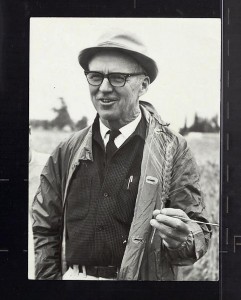“What nobler purpose can there be for a University than to gather up the prizes of a culture — preserve them, propagate them, make them available — so that the best of what has gone before can be preserved and built on?”
–Governor Elmer L. Andersen
“I’ve worked with wheat. But wheat is merely a catalyst, a part of the picture. I’m interested in the total economic development in all the countries. Only by attacking the whole problem can we raise the standard of living for all people in all communities, so they will be able to live decent lives.”
–Dr. Norman E. Borlaug, who would have been 100 years old on March 25, 2014
Elmer L. Andersen (1909-2004) embraced many roles: businessman, Minnesota governor and state senator, newspaper publisher and writer, University of Minnesota Regent, University alumnus (B.B.A. ‘31), philanthropist, and rare book collector.
Norman E. Borlaug (1914-2009), Nobel Peace Prize Laureate and University of Minnesota alumnus (B.S. ‘37, M.S. ‘39, Ph.D. ‘42), is called the father of the Green Revolution, which resulted in a dramatic increase in crop yields due to improved seeds, the use of fertilizers, and irrigation. March 25, 2014 marks what would have been Borlaug’s 100th birthday.
Borlaug’s personal papers are housed within the Elmer L. Andersen Library, home to the University of Minnesota Archives, which holds over 19,000 cubic feet of material chronicling the history of the University.
In May 2004, these two accomplished gentleman met here in Minnesota to discuss the Green Revolution and the movement’s continued work to combat world hunger. Governor Andersen and Dr. Borlaug devoted their energies and talents to different fields, but their passion for service to their local and global communities ran deep. As University alumni, they embraced the University’s mission of research, teaching, and outreach, particularly to outreach as they exchanged knowledge and applied their expertise to addressing community problems and as they made knowledge and resources created at the University accessible to people in local, national, and global communities.
Access to the Borlaug’s papers
As with all collections in the University of Minnesota Archives, Dr. Borlaug’s personal papers are open for anyone to use here in our office — History Day students, University undergraduate or graduate students, members of the community, scholars from other institutions, and University staff and faculty. Visiting University Archives in person is not the only way to use Dr. Borlaug’s collection and related material about the Minnesota Roots of the Green Revolution.
Support from the Minnesota Arts and Cultural Heritage Fund of the Minnesota Clean Water, Land and Legacy constitutional amendment made it possible for University Archives to digitize over 58 cubic feet of unique archival material, including photographs, letters, field notebooks, and administrative records.
The collections document decades of fieldwork and research conducted by not only Dr. Borlaug but by his mentor and colleague University professor E.C. Stakman and in the Department of Plant Pathology and at the Cereal Rust Laboratory.
Events celebrating what would be Borlaug’s 100th birthday
In honor of what would be Norman Borlaug’s 100th birthday on March 25, the University’s College of Food, Agricultural and Natural Resource Sciences (CFANS) will be hosting various events to remember Dr. Borlaug’s legacy and to look toward new and developing research related to food security
As we remember Dr. Borlaug on the occasion of his 100th birthday, University Archives invites people to explore his work and legacy by using the Green Revolution collections online or in person “so that the best of what has gone before can be preserved and built on.”
Erin George is Assistant Archivist at the University of Minnesota Archives. This article originally appeared on the University of Minnesota Libraries’ Primary Sourcery blog.





